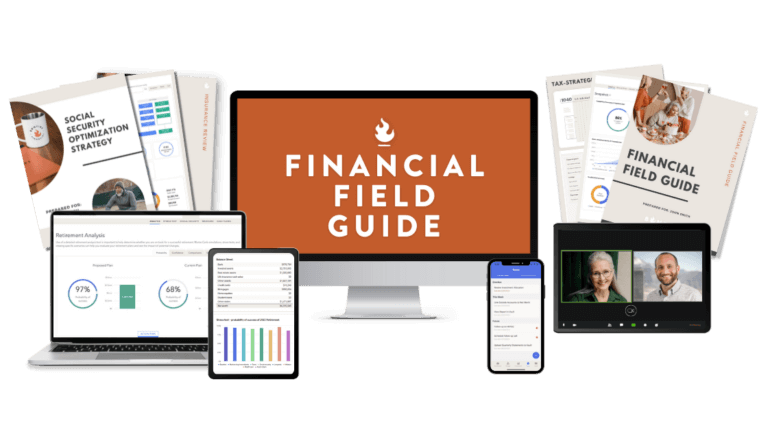HOW DO FINANCIAL ADVISORS GET PAID?
Do you ever wonder how financial advisors get paid? If so you are not alone. It has been estimated that more than one in five people who have a financial advisor does not know what they are paying in advisory fees. You don’t hire a plumber or join a gym without knowing the cost. So why be in the dark about the cost of a financial advisor?
It should be simple enough…sadly, it’s not really straightforward. Understanding the compensation for financial advisors is often puzzling. It’s a perpetual source of confusion, so we are here to break it down.
Let’s first look at 3 different types of advisors you could choose to work with.
3 Types of Financial Advisors:
- A broker or broker-dealer
- Hybrid or dually registered advisor
- Register investment advisor
Broker or Broker Dealer:
First, if an advisor is a broker, which the majority of advisors are, they receive a commission based on the products that they sell and the investments they recommend.
The commission can be upfront (when you buy), it can be on the back end (when you sell), or it can be trailing (they get paid a portion annually). The problem is that with most of them you “should” read the prospectus (the gigantic legal document you get when you buy or get sold a product and throw away when it arrives in the mail) to find out what you are really paying.
Moreover, there is an even bigger problem with brokers which has to do with what is in your best interest. They only follow the “suitability” standard. This says the product or recommendation only needs to be “suitable” for the client. This suitability standard is established by the Financial Industry Regulatory Authority (FINRA) a private nongovernmental organization.
The suitability standard is problematic.
For instance, a broker could recommend a Mutual Fund that is ten times more expensive to own than a comparable Exchange Trade Fund, and that is acceptable because it’s “suitable” for the investor. This obviously raises questions as to why a broker would prefer one investment over the other.
Many brokers push annuities as they are notorious for heavy hidden commissions, but keep in mind any investment could carry a commission. Mutual funds can carry sales loads up to 8.5% and brokers may take 1 to 2% off of a bond’s value for themselves. Think of it as a kickback.
To us, this is a huge conflict of interest and why Bonfire Financial is not a broker.
Dually registered or a hybrid advisor:
Next, let’s look at advisors that are dually registered or considered hybrid advisor. There are some nuances between to a hybrid/dual-registered advisor. For the purposes of this discussion let’s focus on the fact that they are registered investment advisors AND licensed through FINRA (again, a private corporation that acts as a self-regulatory organization).
While that sounds good on the surface there are issues with this format. As a registered investment advisor, they act as fiduciaries and do what is in the best interest of the clients. Great news, but they are also filing with FINRA to sell products as a broker. What? Yes, they can sell investment products and collect a commission.
These advisors can wear two hats with the same client. Not a good look. They can have accounts which they are acting as fiduciaries on and then have another account with the same client in which they act as brokers and only follow the suitably standard.
In a recent research paper published by Nicole Boyson, professor of finance at Northeastern University, The Worst of Both Worlds? Dual-Registered Investment Advisers, she finds dual registrants “have numerous conflicts of interest.” These include cross-selling insurance products, revenue sharing with third-party mutual fund companies, and selling proprietary investment products. She also found dual registrants charge an average of 2.1% on assets under management. This is much higher than the 1% fee most registered investment advisers collect. On top of that, they are more likely to be the subject of disciplinary actions by securities regulators.
How can someone be a fiduciary to a client but not on all their accounts or money? I am still scratching my head on this one. In my opinion, a client would never really know if the recommendations were in their best interest or not! This model was a pass for Bonfire.
Registered Investment Advisor:
Finally, there is the Registered Investment Advisor (RIA). These advisors have a legal obligation to act as fiduciaries. Meaning that they have to act in your best interest at all times. They also must register with the Securities and Exchange Commission (SEC). The SEC is a governmental agency responsible for protecting investors.
Further, a Registered Investment Advisor must explain upfront how they receive compensation. Fees range but generally average somewhere between 1-2% of the total value of the investments under management. An RIA must disclose any conflicts of interest. RIAs usually earn their revenue through a management fee comprised of a percentage of assets held for a client. However, the most important thing to know about RIAs is that they must act as fiduciaries for their clients.
Unfortunately, few advisors that are acting full-time in this capacity, less than 13,000 total in the US, surprising, right?
Fee-Only Vs. Fee-Based
Another thing to consider in determining how financial advisors are paid is whether they are Fee-Only or Fee-Based. While the term Fee-Based may sound very similar to Fee-Only, there are important distinctions.
The Fee-Based model can be susceptible to the same conflicts of interest that the commission structure has. There are many advisors who are mostly fee-based and the majority of their revenues come from fees, yet they can offer you a mutual fund or an investment that normally has a commission, and a conflict.
Fee-Only advisors don’t sell products, don’t accept commissions and they operate as true fiduciaries. Fee-only advisors work for their clients and clients pay an hourly rate, a fixed annual retainer or a percentage of the investment assets.
In conclusion:
I have always strived to be upfront and honest with people and my clients. At a young age, I started my career at a big wire-house and believed I was a fiduciary for my clients and that I could act in their best interest. However, the more I was learning, the more I began to realize the cards were against me. Decisions made at the top made it difficult to truly act in the manner of a fiduciary. I was a vegan in a butcher shop, a sheep in wolf’s clothing.
So, I made a switch and I started Bonfire Financial, a Fee-Only Registered Investment Advisor. Now my core values are in line with the company I am with and I can be a true fiduciary all the time.
If you have any other questions on how Financial Advisors get paid, or if you are curious what category your advisor falls in, feel free to give us a call.
 Client Login
Client Login









